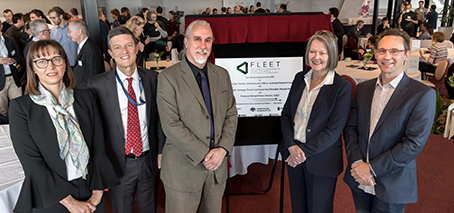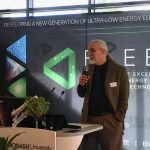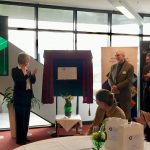Official launch: Australian Research Council Centre of Excellence in Future Low-Energy Electronics Technologies
12 June 2018, 11 AM
New Horizons Building, Monash University, Clayton

We have an insatiable appetite for computing. But our ongoing need for computation is burning more than 5 percent of global electricity. And that figure is expected to double each decade.
A new Australian Research Council Centre of Excellence tackles that challenge head on using cutting-edge new fields of science.
FLEET (The ARC Centre of Excellence in Future Low-Energy Electronics Technologies), to be opened on Tuesday 12 June at Monash University, is a collaboration of more than 100 researchers at seven Australian universities and 13 Australian and international science organisations.
The Centre will use the emerging science of topological materials (recognised by the 2016 Nobel Prize in Physics ) and atomically-thin, ‘two-dimensional’ (2D) materials to create ultra-low energy electronics that achieve zero, or near-zero, wasted dissipation of energy.
“The information technology revolution has improved our lives, and we want that to continue,” says FLEET Director Professor Michael Fuhrer.
“We want self-drive vehicles, on-demand translation, augmented reality, and an ‘Internet of Things’ – not to mention computation-intensive entertainment platforms such as Netflix and YouTube.”
For the past 50 years, our ever-increasing need for more computing was satisfied by improvements in computing technology, which produced ever-smaller, ever-more efficient chips. We refer to this constant shrinking of silicon components as ‘Moore’s law’.
However, as we hit limits of basic physics and economy, Moore’s law is winding down.
“When we exhaust further efficiencies in silicon technology and data-centre management, energy will become the limiting factor for any further computation growth,” says Professor Fuhrer.
Already, information and communications technology is responsible for 5 to 8 per cent of global electricity use, with most of that energy consumption ‘hidden’ out of sight in vast, factory-sized data centres (or server farms). In fact, each smartphone is now responsible for burning more electricity than a household fridge.
Continuing the IT revolution means finding a new electronics technology that uses much less energy.
“FLEET places Australia at the forefront of exciting new scientific research – building capacity for advanced electronics research and training today’s workforce for the electronics industry of the future,” says Fuhrer.
The Centre of Excellence will be opened by ARC Chief Executive Officer Professor Sue Thomas with Monash Provost and Senior Vice President Professor Marc Parlange and FLEET Director Professor Michael Fuhrer. MC will be Professor Ana Deletic, Pro Vice-Chancellor (Research) at the University of New South Wales, Sydney.
More information:
- Contact Errol Hunt media@FLEET.org.au
- Visit FLEET.org.au
- Follow @FLEETCentre
- Watch Future solutions to computation energy use
- Subscribe FLEET.org.au/news
Information and communications technology (ICT):
- ICT now consumes at least 5 to 8 per cent of global electricity, doubling each decade
- We will run out of options for smaller, more-efficient silicon-based chips in the next decade
- Each smartphone is now responsible for burning more electricity than a household fridge.
Speakers at today’s Launch:
Participating universities:
- Monash University
- University of New South Wales
- Australian National University
- RMIT University
- Swinburne University of Technology
- University of Queensland
- University of Wollongong
Partner Organisations Australian Synchrotron; Australian Nuclear Science and Technology Organisation (ANSTO); National University of Singapore; Max Planck Institute for Quantum Optics (MPQ), Garching, Germany; California Institute of Technology (Caltech), USA; University of Maryland, USA; Johannes Gutenberg Universitaet Mainz, Germany; Columbia University, New York, USA; University of Colorado, Boulder, USA; Tsinghua University, Beijing, China; University of Wuerzburg, Germany; University of Texas, Austin; and Joint Quantum Institute (JQI).
Quotes
“This ARC Centre of Excellence will focus on addressing the global challenge of reducing the energy used in information technology and computation, to develop revolutionary electronics and communications technologies.”
Professor Sue Thomas
Australian Research Council
Chief Executive Officer
“Monash University is proud to support the ARC Centre of Excellence in Future Low-Energy Electronics Technologies, which will apply cutting-edge science to develop the technology necessary for a sustainable information revolution.”
Professor Marc Parlange
Monash University
Provost and Senior Vice President
“Australians are increasingly reliant on electronic technology. FLEET’s research will be critical to developing innovations that allow the information technology industry to continue to grow, while also contributing to an affordable, reliable, low-emissions future.”
Senator James McGrath
Assistant Minister to the Prime Minister
“FLEET is an outstanding role model for other institutions that seek practical solutions to problems by pursuing fundamental and basic research.”
Sir Michael Pepper
University College London
FLEET International Scientific Advisory Committee
“It is an exciting time for the study of topological phases of matter, and it is great to see FLEET’s focus on using this new science for more efficient electronics.”
Professor Ali Yazdani
Princeton Center for Complex Materials
International Scientific Advisory Committee
Images











